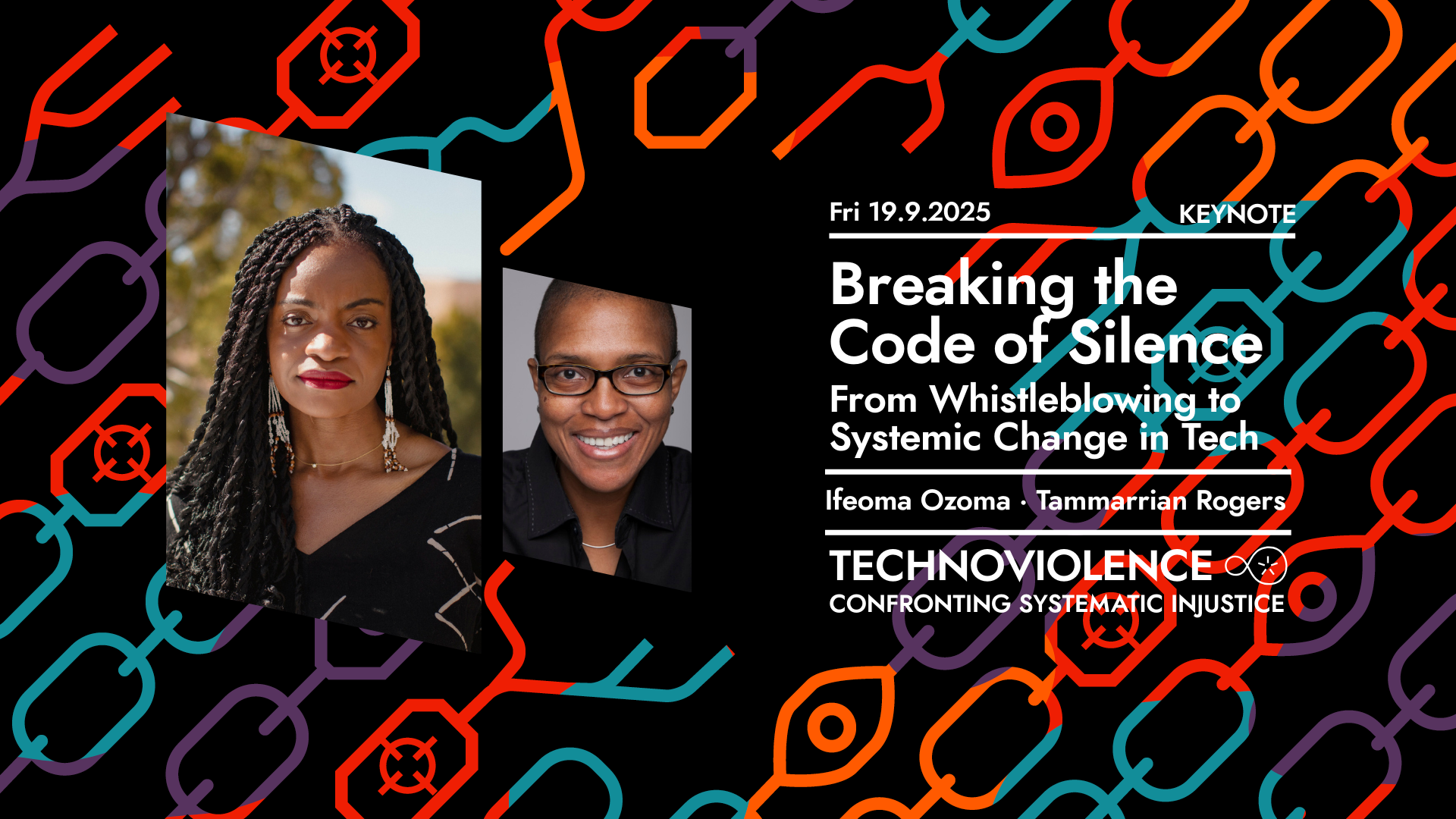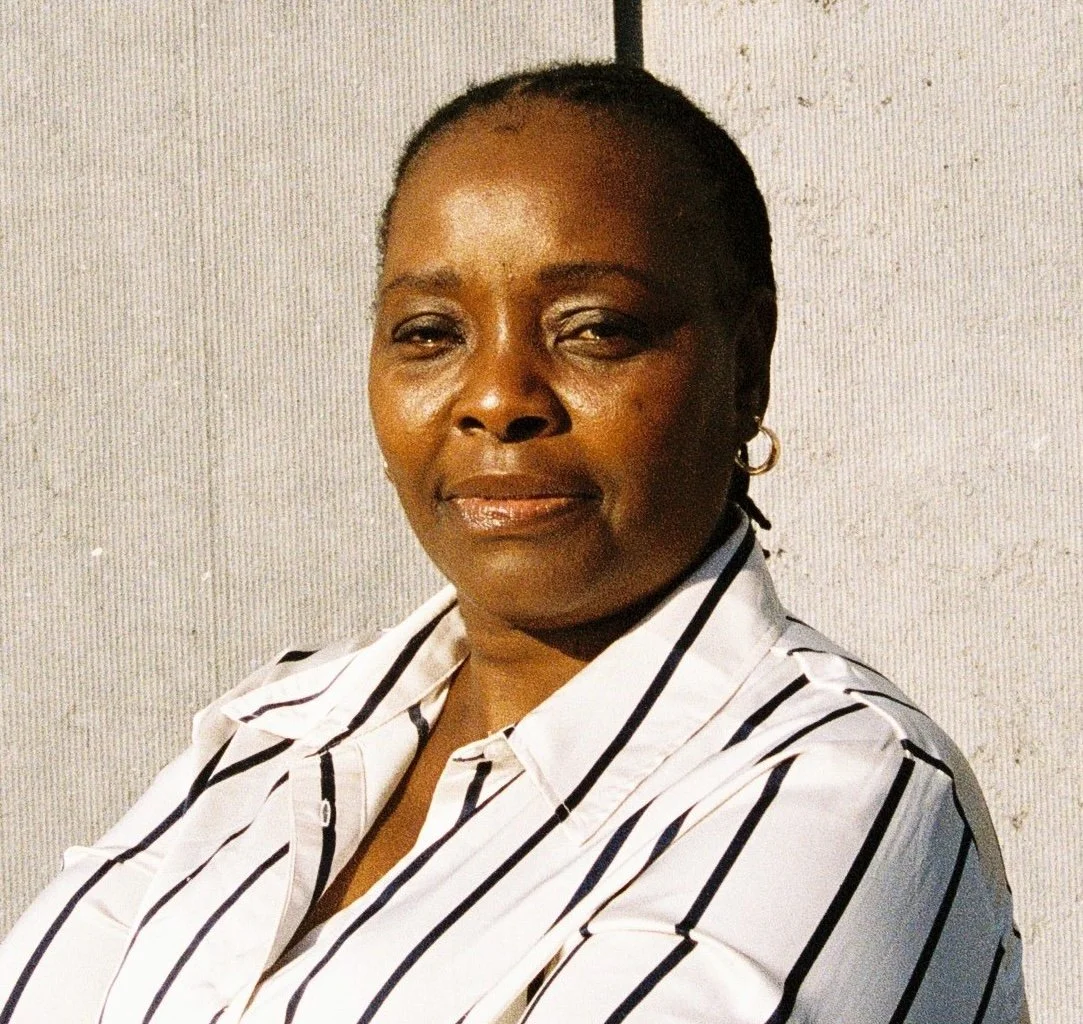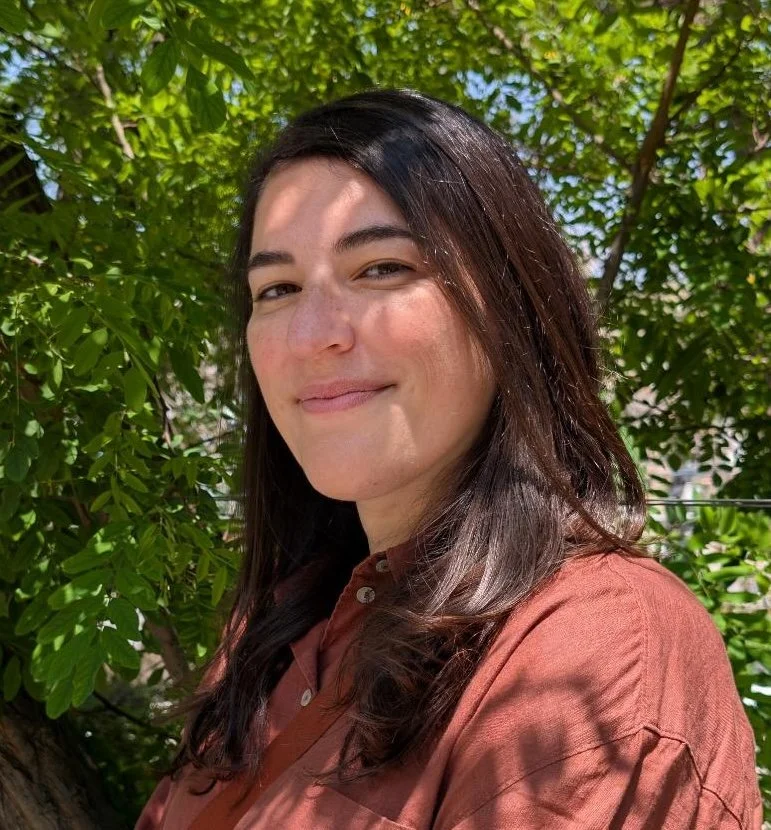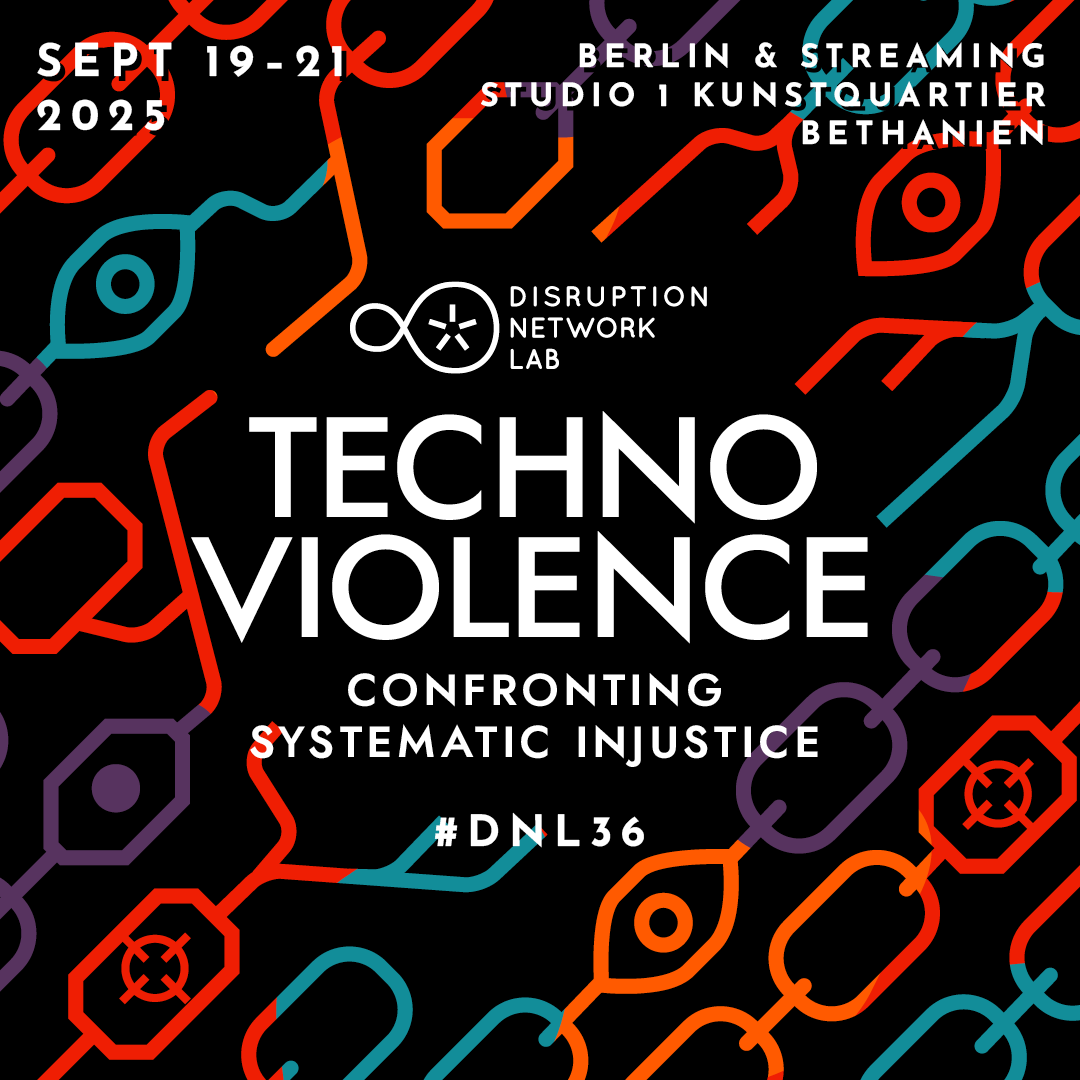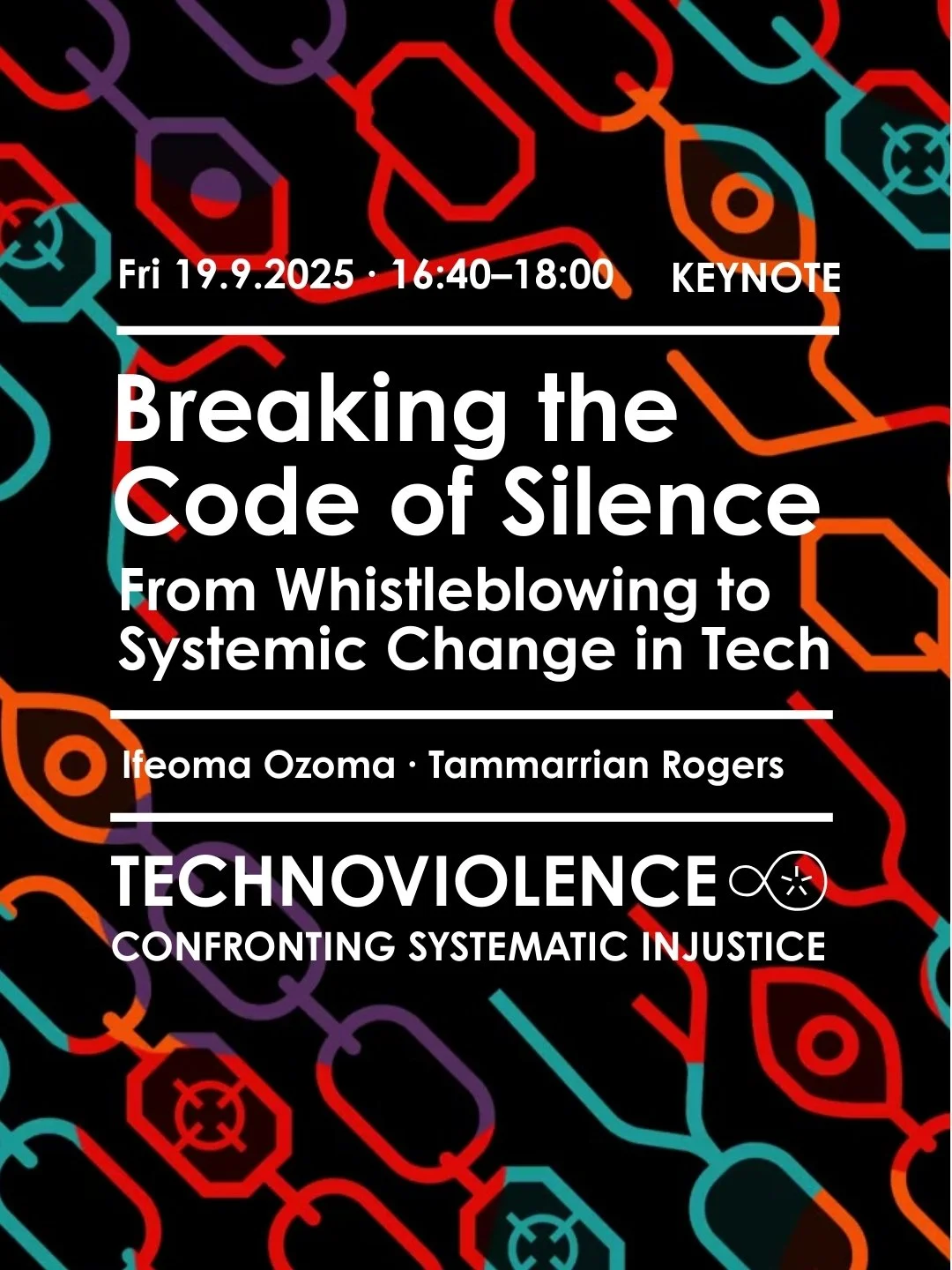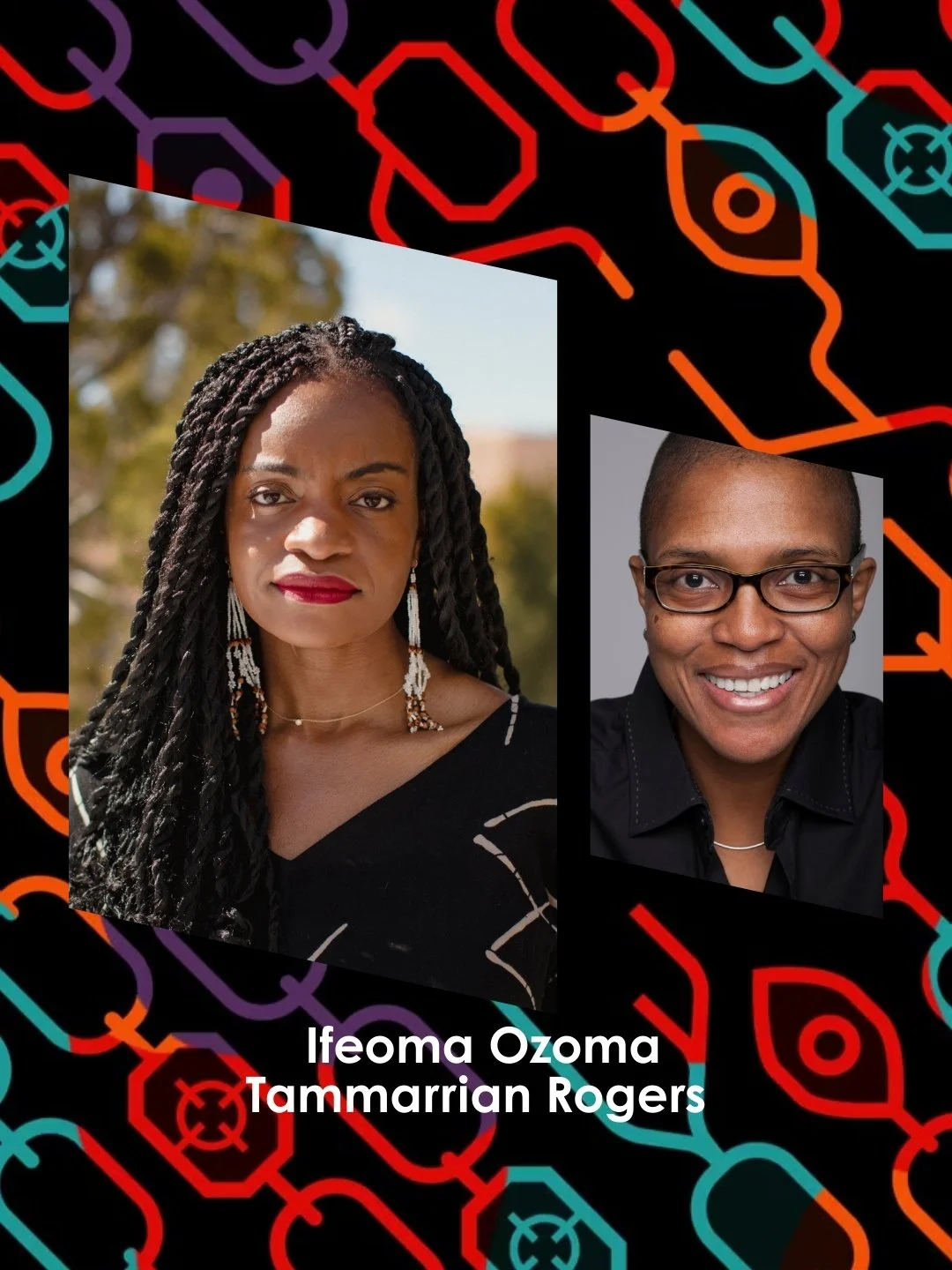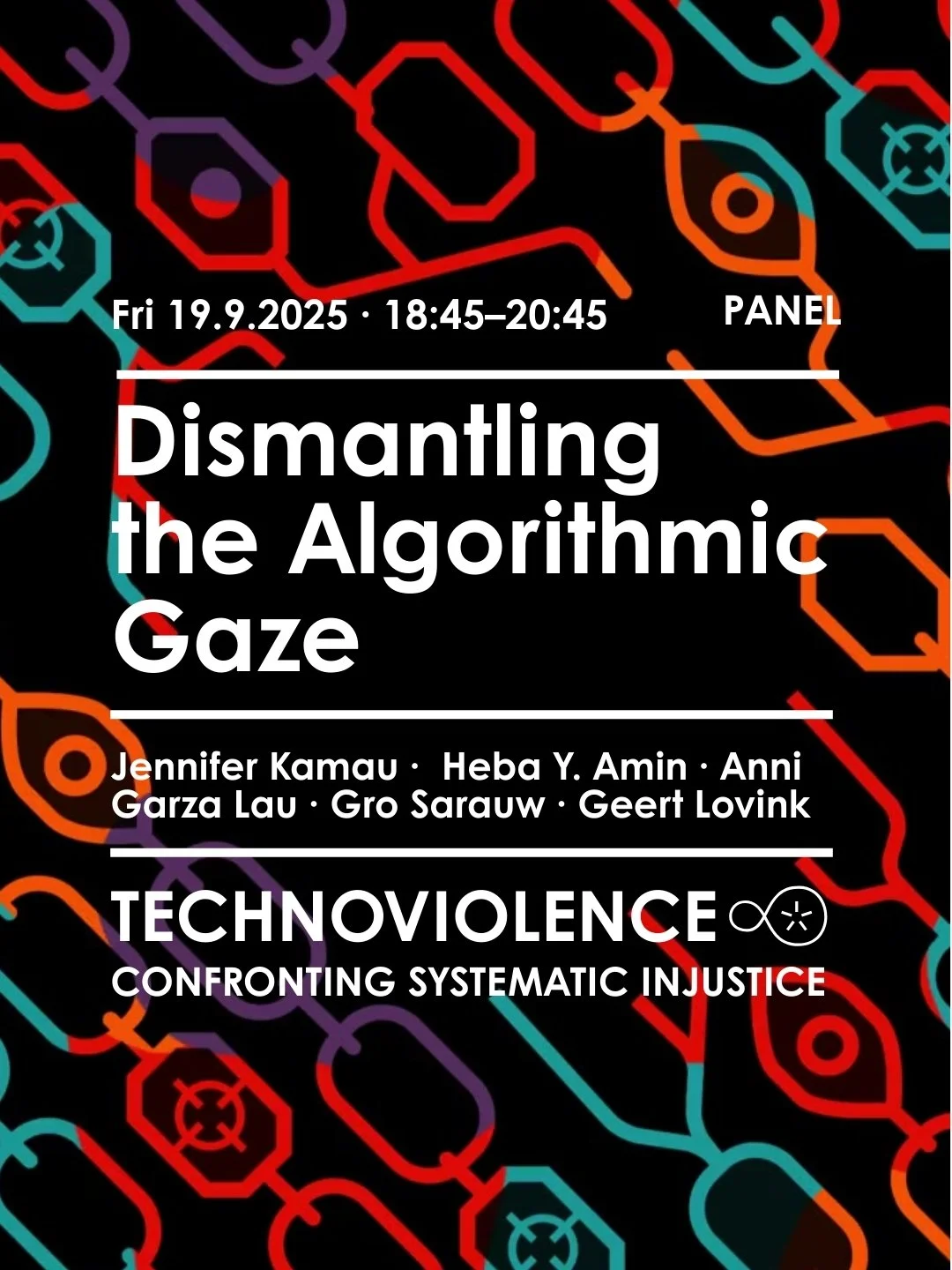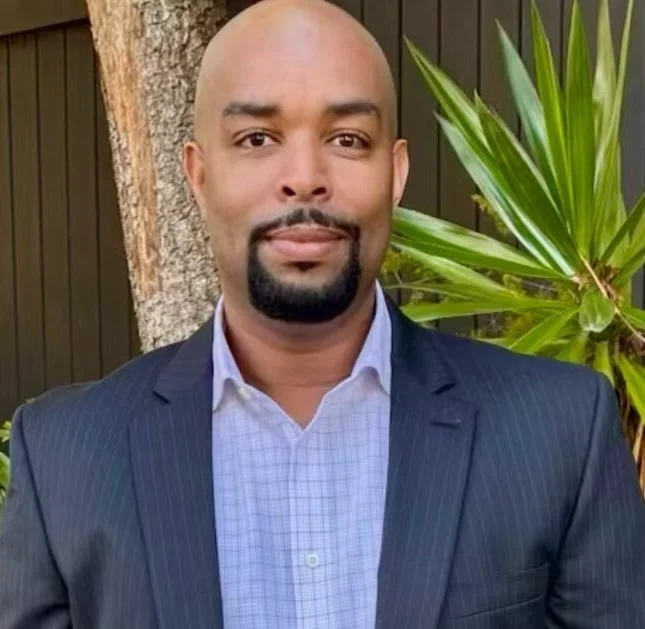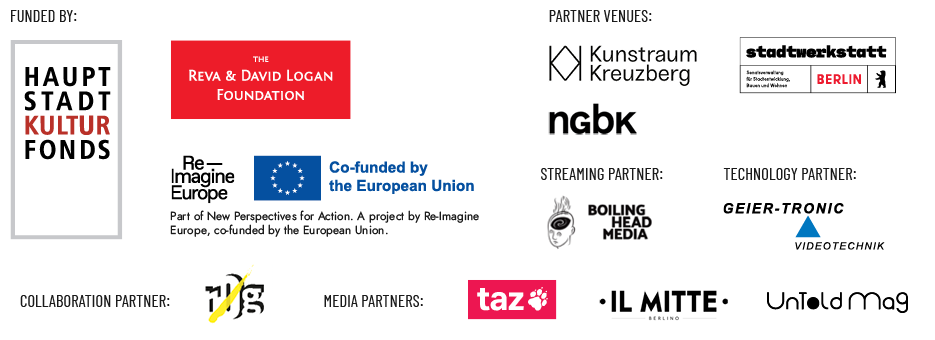#DNL36 · September 19–21 2025
TECHNOVIOLENCE
Confronting Systematic Injustice
THE 36th CONFERENCE OF THE DISRUPTION NETWORK LAB
studio 1, KUNSTQUARTIER BETHANIEN, marianneplatz 2, 10997 Berlin & STREAMING
Workshop at Stadtwerkstatt, Karl-Liebknecht-Straße 11, 10178 Berlin
Curated by Tatiana Bazzichelli (Director, Disruption Network Lab, IT/DE)
Streamed for free. No registration required to follow the stream.
Workshop IS not streamed.
Tickets will also be available at the conference venue on September 19–20, but we recommend that you purchase them online in advance to guarantee your seat.
Watch · Schedule · Introduction · Full Programme · Workshop · Speakers · Tickets · Press
Back to top
Watch Live & Later
Ask questions in the chat
Feel free to post questions to the speakers in advance!
Saturday 20.9.2025
Videos are hosted on YouTube and may load cookes from Google when played.
Sat 20.9.2025 · 16:00 CEST · Exploited, Extracted, Erased: The Global Logic of Big Tech · Rima Sghaier · Sarah Ciston · Lya Cuéllar Safa Ghnaim · Nil Uzun
Sat 20.9.2025 · 18:45 CEST · Secrecy, Surveillance & Grassroots Resistance · Terry Albury · Lynzy Billing · Caitlin L Chandler
Friday 19.9.2025
Fri 19.9.2025 · 16:00 CEST · Breaking the Code of Silence: From Whistleblowing to Systemic Change in Tech · Ifeoma Ozoma · Tammarrian Rogers
Fri 19.9.2025 · 18:30 CEST· On Platform Brutality + Dismantling the Algorithmic Gaze · Jennifer Kamau · Heba Y. Amin · Anni Garza Lau · Gro Sarauw · Geert Lovink
Speakers
Terry Albury · Ifeoma Ozoma · Lynzy Billing · Heba Y. Amin · Anni Garza Lau · Gro Sarauw · Jennifer Kamau · Rima Sghaier · Lya Cuéllar · Sarah Ciston · Safa Ghnaim · Tammarrian Rogers · Caitlin L Chandler · Geert Lovink · Nil Uzun
Terry Albury (Former FBI Agent, Whistleblower, US), Ifeoma Ozoma (Director of Technology Policy, Kapor Center Advocacy, US), Lynzy Billing (Investigative Journalist and Photographer, UK/AF/PK), Heba Y. Amin (Artist, Professor of Digital and Time-Based Art, ABK-Stuttgart, EG/DE), Anni Garza Lau (Artist, Technologist, Co-founder Ghost Agency, MX), Gro Sarauw (Artist, Co-founder Ghost Agency, DK), Jennifer Kamau (Co-founder International Women* Space, Co-lead at the Migrant Justice Community of Practise, KE/DE), Rima Sghaier (Digital Rights Advocate, Researcher, TN/IT), Lya Cuéllar (Journalist and Political Scientist, SV/DE), Sarah Ciston (Critical AI Researcher, Critical–Creative Coder, US/DE), Safa Ghnaim (Critical Tech Researcher, Educator, PS/US/DE), Tammarrian Rogers (Tech Expert, Founder, Sarell, US/UK), Caitlin L Chandler (Writer, Journalist, US/DE), Geert Lovink (Founding Director, Institute of Network Cultures, NL), Nil Uzun (Research Associate in the Research Group Technology and Diversity, Institute of Sociology, RWTH Aachen, TR/DE).
When technology serves power, communities push back
THE 36th CONFERENCE OF THE DISRUPTION NETWORK LAB
Curated by Tatiana Bazzichelli (Director, Disruption Network Lab, IT/DE)
LoCATION: STUDIO 1, KUNSTQUARTIER BETHANIEN, MARIANNENPLATZ 2, 10997 BERLIN
Streamed for free
Back to top
Schedule
Friday, September 19 2025 · Get tickets
16:00 CEST · Doors open
16:30–16:40 · Opening: Tatiana Bazzichelli
Tatiana Bazzichelli (Artistic Director, Disruption Network Lab, Director, Disruption Network Institute, IT/DE).
16:40–18:00 · Keynote: Breaking the Code of Silence: From Whistleblowing to Systemic Change in Tech
Ifeoma Ozoma (Director of Technology Policy, Kapor Center Advocacy, US). Moderated by Tammarrian Rogers (Tech Expert, Founder, Sarell, US/UK).
18:30–18:45 · On Platform Brutality: A Preliminary Book Launch
Geert Lovink (Founding Director, Institute of Network Cultures, NL).
18:45–20:45 · Panel: Dismantling the Algorithmic Gaze
Jennifer Kamau (Co-founder International Women* Space, Co-lead at the Migrant Justice Community of Practice, KE/DE), Heba Y. Amin (Artist, Professor of Digital and Time-Based Art, ABK-Stuttgart, EG/DE), Anni Garza Lau (Artist, Technologist, Co-founder Ghost Agency, MX), Gro Sarauw (Artist, Co-founder Ghost Agency, DK). Moderated by Geert Lovink (Founding Director, Institute of Network Cultures, NL).
Saturday, September 20, 2025 · Get tickets
15:30 · Doors open
16:00–18:15 · Panel: Exploited, Extracted, Erased: The Global Logic of Big Tech
Rima Sghaier (Digital Rights Advocate, Researcher, TN/IT), Sarah Ciston (Critical AI Researcher, Critical–Creative Coder, US/DE), Lya Cuéllar (Journalist and Political Scientist, SV/DE), Safa Ghnaim (Critical Tech Researcher, Educator, PS/US/DE). Moderated by Nil Uzun (Research Associate, Technology and Diversity, Institute of Sociology, RWTH Aachen, TR/DE).
18:45–20:30 · Keynote: Secrecy, Surveillance & Grassroots Resistance
Terry Albury (Former FBI Agent, Whistleblower, US), Lynzy Billing (Investigative Journalist and Photographer, UK/AF/PK). Moderated by Caitlin L Chandler (Writer, Journalist, US/DE).
Sunday, September 21, 2025 · Get tickets
14:00–17:00 · Workshop: Weaving Resistance in the Age of Digital Fascism and Tech Oligarchy
With Rima Sghaier (Digital Rights Advocate, Researcher, TN/IT)
At Stadtwerkstatt. Register before September 18!
Funded by: Hauptstadtkulturfonds (The Capital Cultural Fund), The Reva and David Logan Foundation. Part of New Perspectives for Action. A project by Re-Imagine Europe, co-funded by the European Union.
Partner Venues: Kunstraum Kreuzberg /Bethanien, nGbK, Stadtwerkstatt
Streaming partner: Boiling Head Media.
Technology Partner: Geier-Tronic.
Media Partners: Taz, Il Mitte, UntoldMag
TECHNOVIOLENCE
Confronting Systematic Injustice
The conference Technoviolence: Confronting Systematic Injustice, analyses the production of evidence of systematic injustice. This includes human rights abuses in war conflicts and border regimes, as well as in extractive industries, cyber-surveillance, and political oppression in urban contexts. The conference creates knowledge through situated experience and empower communities to imagine forms of resistance. It combines artistic practices and activist tactics with investigations and the strategic use of online tools to expose human rights abuses and produce evidence of invisible crimes that urgently require public discussion.
The current war in Gaza, the escalating military conflict between Israel and Iran, Russia's invasion of Ukraine, protests in the United States, and the conflict with Mexico, the issue of rearming and securitisation in Europe, have all been key issues at the forefront of our local and international political and media agendas, alongside global humanitarian crises.
With this conference we want to address the role of direct action, art and activism in producing evidence in the context of war conflicts, border regimes and the systematic and strategic targeting of minorities for security purposes at the city level. We aim to inform about the risks of introducing technologies such as artificial intelligence, facial recognition software, cyber-surveillance, or the manipulation of social networks to facilitate state and corporate oppression of vulnerable people, and how art, activism and direct action can help to produce evidence of these issues. We aim to provide insight into this phenomenon and share knowledge among artists, activists, whistleblowers, tech experts, investigators and the civil society at large.
The conference will explore the artistic and investigatory potential to uncover facts, expose wrongdoing and raise awareness of social, political and technological issues. We propose to create a debate inviting organisations, artists and activists based in Berlin and internationally who are working scientifically to expose human rights abuses through artistic practices, investigations and online tools. Furthermore, we aim to focus on how wars, borders and migration routes, but also urban areas are used as strategic testing grounds for technologies of violence and oppression, and how ethnic minorities and vulnerable communities are affected as targeted groups in a process where Big Tech, corporate and state interests are often intertwined.
Back to top
Full Programme
Friday, September 19, 2025 · Get Tickets
16:00 CEST · Doors open
16:30–16:40 · OPENING
Tatiana Bazzichelli (Artistic Director, Disruption Network Lab, Director, Disruption Network Institute, IT/DE).
Back to Schedule
16:40–18:00 · KEYNOTE · Register
Breaking the Code of Silence: From Whistleblowing to Systemic Change in Tech
Ifeoma Ozoma (Director of Technology Policy, Kapor Center Advocacy, US). Moderated by Tammarrian Rogers (Tech Expert, Founder, Sarell, US/UK).
Ifeoma Ozoma’s keynote will examine how nondisclosure agreements and corporate secrecy mechanisms function as instruments of technoviolence, systematically silencing workers who witness and experience discrimination, harassment, and human rights abuses within technology companies. Drawing from her whistleblowing work after Pinterest and her subsequent advocacy for legislative reform, Ozoma will explore how tech companies weaponize legal frameworks to perpetuate injustice and protect corporate interests over vulnerable communities.
The conversation will trace Ozoma’s journey from experiencing gender and race discrimination at Pinterest to breaking her nondisclosure agreement and speaking about systemic inequalities. This act of resistance led to her cosponsorship of California’s Silenced No More Act, landmark legislation that prohibits employers from using NDAs to suppress workers’ voices on discrimination, harassment, and other illegal conduct.
Ozoma will discuss her pragmatic approach to systemic change, rejecting academic theorizing in favor of tangible action that produces immediate material improvements for workers. Through Earthseed, the Tech Worker Handbook, and shareholder activism, she has created playbooks for forcing corporate accountability by leveraging financial risk rather than appealing to corporate conscience. Her strategy demonstrates how understanding power structures, from legislative processes to corporate hierarchies, enables more effective resistance.
The keynote will examine the intersection of individual courage and collective action, highlighting how marginalized individuals within tech face disproportionate retaliation while being essential to exposing systemic violence. Ozoma will address broader themes of technoviolence, including how surveillance technologies, algorithmic discrimination, and platform policies harm vulnerable communities globally. She will emphasize the urgency of current action, arguing against the American myth of individual mobility that prevents tech workers from recognizing their shared position as exploited labor regardless of salary levels.
Back to Schedule
18:30–18:45 · BOOK LAUNCH · Register
On Platform Brutality
Geert Lovink (Founding Director, Institute of Network Cultures, NL).
Geert Lovink will present a new essay that is part of his new book, Platform Brutality, coming out late September (Valiz, 2025). It is third part of a triptych after the books Sad by Design (2019) and Stuck on the Platform (2022). After decade of docile facilitation and sneaky extractivism Silicon Valley is now showing its ugly face. This is not only initiated by Trump II but also coincides with the overall stagnation and regression in terms of social media usage. Platform Brutality is a scathing diagnosis of our digital condition in the aftermath of Covid, grappling with a world overwhelmed by platform decay, social media addiction, and a psychic toll.
The central thesis is that social media no longer just distracts—it wounds. The internet turns brutal. And yet, we stay. Lovink labels the dominant emotional landscape as copium—a metaphorical opiate for digital despair, numbing users trapped in endless loops of scrolling, doom, and distraction. The book covers topics such as the paradox of loneliness on social media, mythologies of smart phones, the role of dreaming in this digital age and techno-feudalism as the political economy of Big Tech oligarchy. The internet’s current state is one of permacrisis: a condition of stagnation, rage, and numbness, where algorithmic manipulation, AI slop, enshittification, and techno-feudalism define the everyday. As the eighth volume in Lovink’s critical internet cultures series, the book moves from critique to exit strategies: first diagnosis, then treatment. Platform Brutality is a monument to digital fatigue, and a final urgent appeal for collective withdrawal. After a brief introduction to the chapters, Lovink will read an excerpt from the title essay.
Back to Schedule
18:45–20:45 · PANEL · Register
Dismantling the Algorithmic Gaze
Jennifer Kamau (Co-founder International Women* Space, Co-lead at the Migrant Justice Community of Practice, KE/DE), Heba Y. Amin (Artist and Professor of Art, ABK-Stuttgart, PS/DE), Anni Garza Lau (Artist, Technologist, Co-founder Ghost Agency, MX), Gro Sarauw (Artist, Co-founder Ghost Agency, DK). Moderated by Geert Lovink (Founding Director, Institute of Network Cultures, NL).
This panel analyses how forms of algorithmic and technological control are emerging at borders, in militarised contexts and in urban environments, spanning examples from Germany to Mexico and North Africa. It also discusses how we can imagine forms of resistance and empowerment based on social justice, using opacity as a means of resistance, as well as technological tools and collective action to counter epidemic violence.
As a migrant woman and activist in Germany at International Women* Space, and the Migrant Justice Community of Practice, Jennifer Kamau examines how border technologies such as Frontex, EURODAC, and the European asylum regime, surveil and control Black and Brown people. These systems shape daily realities of exclusion and criminalisation, exemplified by tools like the Bezahlkarte and recent border standoffs with neighbouring countries. She also explores the intersection of technological and environmental violence, highlighting how climate-induced displacement exacerbates the vulnerability of marginalised communities. Furthermore, she discusses the risks posed by AI, facial recognition, and cyber-surveillance in facilitating state and corporate oppression in migration.
The talk is followed by Heba Y. Amin’s presentation “Opacity as Resistance: Reversing the Image Politics of Empire”. In an effort to maintain colonial control in North Africa, the British military founded the Middle East Command Camouflage Directorate near Cairo in 1941. British artists were recruited to engineer large-scale illusions designed to mislead enemy surveillance. Camouflage, in this case, was not merely a tactical device but part of a broader scopic regime of empire. Its operations relied on a colonial gaze that reframed the desert as an empty landscape for optical manipulation, erasing its inhabitants in a theatre of deception. Drawing from this history, this presentation asks how we can subvert and reclaim camouflage as a counter-methodology: not a technique of domination, but a practice of opacity, refusal, and disruption aimed at dismantling the militarised, algorithmic gaze and imagining resistant forms of visibility.
Anni Garza Lau and Gro Sarauw introduce the work of Ghost Agency. Ghost Agency operates at the intersection of research, artistic practice, digital technology and humanitarian inquiry. Working trans-locally between Mexico, the United States and Europe–yet rooted in Mexico’s specific context–the group investigates how gender violence and tehcno-impunity converge in systemic patterns of abuse, producing injustices in the digital age, especially for women and the environment. As a search for antidotes to epidemic violence under capitalism’s technological and institutional dismemberment of human lives, their practice is both a catalyst for novel literacies and technological designs and a response to neglected humanitarian aspects of digital technologies, which, Ghost agency claims, lead to forms of repression such as those faced by many women in Mexico.
Moderated by Geert Lovink, the following conversation explores how digital infrastructures enable systemic violence and reimagine what comes next.
Saturday 20 September 2025 · Get tickets
15:30 · Doors open
Back to Schedule
16:00–18:15 · PANEL · Register
Exploited, Extracted, Erased: The Global Logic of Big Tech
Rima Sghaier (Digital Rights Advocate, Researcher, TN/IT), Sarah Ciston (Critical AI Researcher, Critical–Creative Coder, US/DE), Lya Cuéllar (Journalist and Political Scientist, SV/DE), Safa Ghnaim (Critical Tech Researcher, Educator, PS/US/DE). Moderated by Nil Uzun (Research Associate, Technology and Diversity, Institute of Sociology, RWTH Aachen, TR/DE).
This panel traces the systemic and extractive logic of Big Tech, examining how today’s digital infrastructures are weaponised against vulnerable communities. Topics include AI systems accelerating warfare, targeting campaigns on social media, erasing Palestinian voices, building techno-colonialist utopias in Central America and exploiting workers in the Democratic Republic of the Congo. Speakers unpack the intersections between digital repression, xenophobia, and platform complicity, while offering critical tools for understanding and resisting technoviolence in its many forms.
In the presentation “Targeted by Design: Technoviolence, Xenophobia, and Algorithmic Injustice in SWANA“ Rima Sghaier explores how Big Tech and social media advertising enable and reinforce information disorder, fuelling xenophobic campaigns targeting vulnerable communities, while erasing the narratives of others, namely Palestinian voices. By unpacking platform design choices, extractive data economies, digital militarism, and feminist critiques of power in tech, the talk traces how communities are profiled, policed, and profitably excluded. What does it mean when violence is not incidental, but systematically designed into our digital infrastructures?
When the same chatbots and automated agents many people use daily are being scaled up to wage wars, we must better understand these AI systems and hold them to account. Sarah Ciston presents her artistic project AI War Cloud Database with her talk “Mapping the Techno-Imperial Boomerang”. AI War Cloud Database catalogues the AI decision-making systems used in warfare, which have been shown to accelerate and amplify death and destruction. The project details 50+ systems based on the type of machine learning tasks they use; who develops, deploys, and funds them; and their military and commercial purposes – in order to show how global technoviolence traces directly back to our mobile phones and social platforms. With the spotlight now on systems like Palantir’s Foundry and Israel’s Lavender, the stakes for AI tools are becoming increasingly urgent and personal.
In an era of global democratic backsliding, Central America is being used as a laboratory for new autocratic strategies. Tech entrepreneurs and libertarian ideologues see our nations as testing grounds for their ideas outside of the rule of law. Shifting the focus from digital infrastructure to the real world, Lya Cuéllar will trace this scenario. From private cities in the Caribbean, through a failed experiment with crypto as legal tender, to the transnationalisation of the carceral state, these actors in the US and Europe work with local elites to turn the region into a blueprint for their plans at home. Communities are being displaced and criminalised in the name of techno-colonialist utopias while the parallel erosion of democratic institutions leaves them with few options to fight back. And yet, everyday people are showing creative possibilities for resistance in a new global dystopia.
In the talk “Digitized Divides: Revealing the trade-offs of a tech-dependent world”, Safa Ghnaim shares stories of the exploitation and extractivism of technologies: from the mining to manufacturing and applications, painting a picture of the devastation left in its tracks by the owners and operators of these tools. In particular, focusing on technoviolence in the DR Congo and in Palestine gives an insight into how business models, power structures, and systems of oppression make our global struggles interconnected. None of these stories are new, but they are lesser known, hidden on the feeds of social media and painted over by Big Tech marketing campaigns. Listen to just a few critical cases and you’ll find out what’s really beneath the shiny surface of technology.
Back to Schedule
18:45–20:30 · KEYNOTE · Register
Secrecy, Surveillance & Grassroots Resistance
Terry Albury (Former FBI Agent, Whistleblower, US), Lynzy Billing (Investigative Journalist and Photographer, UK/AF/PK). Moderated by Caitlin L Chandler (Writer, Journalist, US/DE).
This keynote maps the intersection of secrecy, state violence, and grassroots work, showing how insider courage and deeply personal reporting can disrupt entrenched systems of digital and real-world oppression. It brings together in a conversation Terry Albury, a former FBI counterterrorism agent whose leaks revealed systemic profiling and surveillance tactics deployed on journalists, vulnerable and marginalised communities (e.g. LGBTQ+, racial, ethnic and religious minorities, as well as women and migrants), and Lynzy Billing, a British investigative journalist and photographer of Afghan-Pakistani origins whose reporting exposed the human toll of the anti-terrorism strategies that US has deployed in Iraq and Afghanistan.
Exposing national security secrets requires courage and involves confronting the mainstream media's silence on the issue. This work involves truth-tellers, whistleblowers and investigative journalists, who risk a great deal to denounce misconduct and wrongdoing. However, at a time when marginalised people are being targeted, monitored, detained, incarcerated, and eventually killed, it is also important to focus on the work of local community members who are often the first to reveal abuses. Grassroots activism, providing a platform for first-hand accounts and documentation, can expose the systematic violence and oppression experienced by marginalised communities.
The keynote will discuss concrete examples of digital and real-world systems of oppression, highlighting the necessity of reporting from the ground and also providing safe systems for whistleblowers at local and national levels. Almost twenty-five years after the “war on terror”, how is “national security” being weaponised domestically and abroad? Is the media investigating the structural abuses of institutions, or failing to hold states accountable? As the world experiences a trend towards authoritarianism and re-militarisation, and as technology evolves to allow for widespread surveillance of dissidents and journalists, what possibilities remain for resistance? This discussion will provide an opportunity to share stories connecting the experiences of the speakers with those of the Disruption Network Lab's community of activists, human rights defenders, tech experts, investigative journalists, artists, dissidents, and more.
Back to top
Sunday September 21 · Register before Sept 11
Workshop · Weaving Resistance in the Age of Digital Fascism and Tech Oligarchy
Sunday 21 September, 14:00–17:00, Stadtwerkstatt (Karl-Liebknecht-Straße 11, 10178 Berlin)
With Rima Sghaier (Digital Rights Advocate, Researcher, TN/IT)
Max 30 participants. Register before September 18.
In recent years, we have witnessed the rise of fascist, anti-democratic discourses across political, social, and human rights contexts both online and offline. Transnational networks are actively spreading anti-rights narratives and legitimizing repression. As AI and surveillance infrastructures become deeply embedded in everyday life, they are increasingly used by authoritarian states, law enforcement, and corporate tech elites to monitor, silence, and criminalize, especially those already pushed to the margins. This collaborative workshop centers the knowledge of those most harmed by digital systems: migrants, racialized communities, queer people, and those living under occupation, censorship, or systemic exclusion. It offers a space to contribute, analyze, and reimagine how we document harassment in regions often overlooked by platforms and media.
Together, we will trace patterns of online harassment and transnational hate campaigns, examining how they reinforce broader systems of fascism, patriarchy, and technoviolence. We will also explore the role and complicity of Big Tech in enabling and profiting from these dynamics. Led by Rima Sghaier, case studies will include targeted harassment campaigns against minorities and activists in the SWANA region. Through discussion, co-writing, and strategic imagination, we will build a living archive of the under-reported and ask: What counts as evidence? Who controls visibility? And how do we reclaim digital spaces when they are built to exclude us?
This workshop is designed for international participants with an interest in platform accountability, responsible tech, and digital resiliency, including those who have personally experienced digital repression, surveillance, or online harassment. No prior technical skills are required. Participants are encouraged to bring laptops and/or mobile phones, if they have access to these devices.
Back to top
Press
Press Kit & Registration
Media Kit (pdf) · Press Kit folder (Press release EN/DE, Photos & More)
Press Registration · Write us to organise interviews
Articles
US Whistleblower: »Legen willkürlich fest, wer Terrorist ist«
Technoviolence: When Technology Becomes a Tool of Oppression (in Italian)
The Hidden Violence of Technology Interview with Safa Ghnaim (in Italian)
Back to top
Speakers
Terry Albury
Former FBI Agent, Whistleblower, US
Terry Albury is a former FBI counterterrorism agent whose nearly 17-year career began in the immediate aftermath of 9/11. After years of ideological compromises, he made a series of unauthorised disclosures to The Intercept resulting in the comprehensive and exhaustive journalistic piece known as The FBI’s Secret Rules. His revelations stemmed from an internal crisis of conscience as he witnessed the U.S. government’s baseless and vindictive targeting of vulnerable and marginalised communities under the specious pretext of national security. This act of civil disobedience was rewarded with a prosecution under the Espionage Act and a sentence of four years in federal prison. In a display of solidarity, multiple scholars of constitutional law along with The Reporters Committee for Freedom of the Press submitted amicus briefs on his behalf which contextualised the importance of these revelations especially as they pertained to holding the FBI accountable for blatant and repeated abuses of law under the opaque and duplicitous “war on terrorism.” Today, he lives in the San Francisco Bay Area where he supports the work of lawyers, civil rights/liberties organisations, academics, and journalists.
Lynzy Billing
Investigative Journalist and Photographer, UK/AF/PK
Lynzy Billing is a British investigative journalist, photographer and filmmaker of Afghan-Pakistani origins who has reported extensively on conflict and human rights abuses from Afghanistan and Iraq since 2019. Prior to this she was based in the Philippines where she produced investigations on the war on drugs and newborn trafficking. In December 2022, Billing published "The Night Raids" a nearly four-year investigation exposing CIA-backed Afghan special forces’ deadly night raids that killed hundreds of civilians based on faulty intelligence. Based on over 350 interviews and visits to 30+ raid sites, the investigation offered rare insight into the human cost of U.S. counterterrorism strategies. The work won eight awards that year including the Edward R. Murrow Award, The Columbia Journalism School Meyer “Mike” Berger Award, The Ed Cunningham OPC Award and the Michael Kelly Award, and was a finalist for eight more. In June 2023 her ProPublica short film “The Night Doctrine” in partnership with The New Yorker, based on the investigation, premiered at Tribeca Film Festival. It went on to screen at 15 more film festivals that year and won three Emmy awards.
Ifeoma Ozoma
Director of Technology Policy, Kapor Center Advocacy, US
After two years working on public policy at Pinterest, Ifeoma Ozoma resigned and spoke about gender and race discrimination she experienced at the company. She subsequently began a consulting firm called Earthseed and has worked to advocate for whistleblower protection legislation and other worker protections in the technology industry. At Earthseed, she co-sponsored the Silenced No More Act in California.. This legislation, signed into law in 2021, allows workers to share information about harassment and discrimination, regardless of a nondisclosure or nondisparagement agreement. Additionally, Ifeoma co-founded the Transparency in Employment Agreements Coalition, which leveraged shareholder engagement to expand the protections of California’s Silenced No More Act globally, leading to reforms at Salesforce, Apple, Alphabet, Expensify, Twilio, and Microsoft.
Ifeoma also held public policy and government relations roles at Google, Facebook, and Pinterest and holds a Bachelor of Arts in Political Science from Yale University. Outside of work, Ifeoma loves time with her family on their hobby farm in New Mexico. When she’s not busy with their 4 dogs, goats, chickens, rabbits, innumerable fruit trees, and berry bushes, she can be found inside playing The Legend of Zelda: Tears of the Kingdom.
Heba Y. Amin
Artist, Professor of Digital and Time-Based Art, ABK-Stuttgart, EG/DE
Artist Heba Y. Amin engages with political themes and archival history, using mixed-media including film, photography, performance and installation. Her artistic research takes a speculative, often satirical, approach to challenging narratives of conquest and control. Amin is Professor of Digital and Time-Based art at the State Academy of Fine Arts in Stuttgart, co-founder of Black Athena Collective, curator of visual art for MIZNA journal, and currently sits on the editorial board of the Journal of Digital War. She was awarded the 2025 Hans-Molfenter Preis/City of Stuttgart Prize, 2022 Nordhorn City art prize, the 2020 Sussmann Artist Award for artists committed to the ideals of democracy and antifascism, and the 2019 Field of Vision Fellowship. Amin’s work has been shown in numerous exhibitions including The Mosaic Rooms, London (2021), Eye Film Museum, Amsterdam (2020), Quai Branly Museum, Paris (2020), MAXXI Museum, Rome (2018), Liverpool Biennial (2021), to name a few. Her publication, Heba Y. Amin: The General’s Stork (ed. Anthony Downey) was published by Sternberg Press in 2020 and her works and interventions have been covered by The New York Times, The Guardian, the Intercept, and BBC among others. Furthermore, Amin is one of the artists behind the subversive graffiti action on the set of the television series “Homeland” which received worldwide media attention.
Anni Garza Lau
Artist, Technologist, Co-founder Ghost Agency, MX
Anni Garza Lau is a Mexican artist and researcher exploring the affective, political, and social dimensions of human-machine interactions. Her practice spans electronic art, critical technologies, and community-based processes. She is co-founder, with Gro Sarauw of Ghost Agency, a Danish-Mexican initiative that advocates for digital human rights through artistic research and technology training for vulnerable communities, particularly women. Anni’s work has been presented internationally and she is a member of the Mexican National System of Art Creators.
Gro Sarauw
Artist, Co-founder Ghost Agency, DK
Gro Sarauw is an artist, organiser and architect based in Copenhagen. She reseaerches concepts of spatial justice in digital humanities and transformational potentials of artistic research and practice. In 2021 her research initiative led to the foundation of Ghost Agency, an artistic research practice and advocacy for women’s rights in the digital age with the Mexican artist Anni Garza Lau. Operating at the intersection of artistic practice, digital technology, and humanitarian inquiry, Ghost Agency works translocally between Mexico, the U.S., and Europe. They have exhibited in Mexico City, Tecate (MX), Los Angeles, San Diego, Barcelona and Copenhagen. Besides their research including developing cybersecurity technologies and literacies, they lecture and teach at art schools and universities.
Jennifer Kamau
Co-founder International Women* Space, Co-lead at the Migrant Justice Community of Practice, KE/DE
Jennifer Kamau is a Berlin-based activist and researcher. She is one of the initiators of the International Women Space, which is a network of (former) asylum seekers and migrants that fosters solidarity and collaboration, produces books, organizes campaigns and conferences on the issues of asylum seekers and migrants. This network emerged from the "famous" occupation of the Oranienplatz in Berlin-Kreuzberg some years ago, as a feminist response to the predominantly male concerns of the insurgent refugees. Most recently Kamau co-organised "When I came to Germany" (2017), a two-day conference focusing on the experiences of women who came to West Germany as guest workers, to East Germany as contract workers, as migrants, and refugees to the reunified Germany and of German women who are affected by racism. Recent publications include In Our Own Words. Refugee Women in Germany Tell Their Stories (2015).
Rima Sghaier
Digital Rights Advocate, Researcher, TN/IT
Rima Sghaier is a feminist activist, researcher, policy analyst, FOSS enthusiast, and an avid advocate for internet freedom. Her work and research focus on the intersection of human rights, gender, policy and tech. She has worked with various digital rights NGOs with particular focus on issues of freedom of speech and digital safety in the SWANA region. She is a member of the The MENA Alliance for Digital Rights and The Global Coalition for Tech Justice. Rima holds a Bachelor and a Master’s degrees in Public Law and Political Science from the Faculty of Juridical, Political and Social Sciences of Tunis.
Lya Cuéllar
Journalist and Political Scientist, SV/DE
Lya Cuéllar is a Salvadoran journalist based in Berlin and co-founder of the feminist media organisation Alharaca. Her work focuses on democracy and human rights both back home and in Germany. She is a journalist and political scientist with bylines in outlets in Germany and Central America. In 2019, she founded Alharaca, a Central American media start-up considered a trailblazer for feminist journalism in Latin America. In addition to journalism, she works for civil society organisations in Germany and Latin America in the field of communication and project management. She is currently working on two multilingual podcast formats.
Sarah Ciston
Critical AI Researcher, Critical–Creative Coder, US/DE
Sarah Ciston is an artist-researcher building tools to bring intersectional, critical–creative approaches to machine learning and a PostDoc at IT:U from October 2025. They hold a PhD in Media Arts + Practice from University of Southern California and are the author of A Critical Field Guide for Working with Machine Learning Datasets. They are also the founder of Code Collective: an approachable, interdisciplinary community for co-learning programming. Sarah has held fellowships at the Center for Advanced Internet Studies and the Humboldt Institute for Internet and Society, and they were recently named an AI Newcomer by the German Society for Computing. Their art and research has been featured at Akademie der Künste Berlin, Chaos Communication Camp, the European Commission, Google Season of Docs/p5.js, Mozilla Festival, MU Eindhoven, MUTEK, re:publica, Science Gallery London, Scottish AI Alliance, and elsewhere, with writing in Leonardo Journal and AI and Society, and a book forthcoming from MIT Press.
Safa Ghnaim
Critical Tech Researcher, Educator, PS/US/DE
Safa Ghnaim spent her formative years assisting in presentations at multicultural, folk, and peace festivals around the United States with the aim of preserving the endangered art of traditional Palestinian embroidery and educating the public on the Palestinian diaspora experience. In 2018, Safa edited the book Tatreez & Tea: Embroidery and Storytelling in the Palestinian Diaspora, a project that was very personal for her. Safa is passionate about inclusivity and accessibility, as well as the intersectionality between environmentalism, human rights, and animal rights. Since 2018 she has been working with Tactical Tech on the Data Detox Kit, and has assisted in various Glass Room Community Edition installations.
Tammarrian Rogers
Tech Expert, Founder, Sarell, US/UK
Tammarrian Rogers worked in the tech industry in the United States for more than 30 years. She has worked at several companies including General Motors, Apple, Microsoft, and Snap. Her career has offered her the opportunity to lead cross-functional teams with a focus on product engineering, quality assurance, release management and product localisation and globalisation. Tammarrian has also served on community, non-profit and for-profit steering committees and boards. These organisations include Ada Developer’s Academy, NordVPN, Northwest Tech Equity Initiative (NWTEI), and OPTYVA, a social purpose organisation specialising in business sustainability, community development and conscious lifestyle transformations. In November 2021, Tammarrian left her position as Snap’s first Inclusive Engineering Director to focus on the development of a robust product development methodology that builds and nurtures trust among customers. She advises socially conscious businesses and hosts multi-generational and mutli-disciplinary convenings to foster collective listening, learning and action towards a trustworthy tech industry. Tammarrian enjoys hiking, traveling, dogs, and connecting with friends, family and strangers. She currently resides in London.
Caitlin L Chandler
Writer, Journalist, US/DE
Caitlin L Chandler is a longform journalist and writer covering migration, security and human rights (among other topics). She teaches journalism and creative nonfiction writing as adjunct faculty at the Council on International Education Exchange (CIEE) in Berlin and at the Berlin Writers Workshop. In 2024, she received a grant from the Pulitzer Center for Crisis Reporting and in 2023, a Robert B. Silvers Foundation Grant for Work in Progress. Previous grants/awards: International Women's Media Foundation fellowship; Investigative Journalism for Europe cross-border grant (as part of a team); EU Migration Media Award nomination (2019); European Cross Border grant from Journalismfund.eu as part of a team; International Reporting Project Africa Peacebuilding and Conflict Resolution fellowship on Sudan; the German Otto Brenner Preis for investigative reporting (as part of a team); and an Anne LaBastille Writing Residency. Her story for CJR, The Doctors vs #MeToo, was highlighted on Longreads and Longform and her work has appeared on the cover of The Washington Post Magazine. Formerly a senior editor at Africa Is A Country, she holds an MFA from Randolph College.
Geert Lovink
Founding Director, Institute of Network Cultures, NL
Geert Lovink is a Dutch media theorist, internet critic and author of many books, including Stuck on the Platform (2022), Sad by Design (2019), Organisation after Social Media (with Ned Rossiter, 2018), Social Media Abyss (2016), Zero Comments (2007), Dark Fiber (2002). Almost all these books have been translated into German, Italian and Spanish. Geert Lovink got his BA and MA in Social and Political Sciences from the University of Amsterdam in 1984 and did his PhD at the English Department, Media & Communication Program at the University of Melbourne (2002). From 2007-2017 he was Professor of Media Theory at the European Graduate School, and from 2004-2012, an associate professor in the digital cultures program of Media Studies at the University of Amsterdam. In 2004 he founded the Institute of Network Cultures, which organises conferences, publications and research networks such as Video Vortex (online video), The Future of Art Criticism and MoneyLab (internet-based revenue models in the arts). Recent projects deal with digital publishing experiments, critical meme research, participatory hybrid events and precarity in the arts.
Nil Uzun
Research Associate, Technology and Diversity, Institute of Sociology, RWTH Aachen, TR/DE)
Nil Uzun is a postdoctoral research associate with the Chair of Technology and Diversity at the Institute of Sociology, RWTH Aachen University. She holds degrees in economics, cultural studies, and social anthropology, and earned her Ph.D. in sociology from Rutgers University. She has conducted research on the global politics of knowledge, science, and technology, including studies of human rights networks in Argentina and Turkey, artistic and scholarly representations of the “Middle East,” and the geopolitics of computing speed in the global race for the fastest supercomputers. Her current project, FairComp, funded by RWTH Exploratory Research Space, examines international initiatives mobilising against the militarisation of computational technologies, investigating how diverse actors challenge algorithmic warfare, autonomous weapons, and military AI, and analysing the alternative technoscientific futures that emerge within these contestations.




